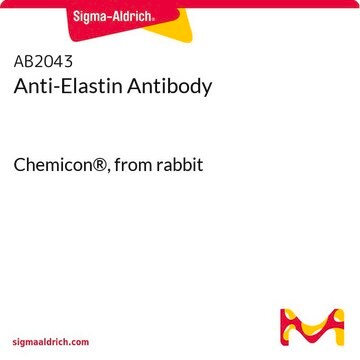T0706
Tropoelastin human
recombinant, expressed in E. coli, 1 mg
Anmeldenzur Ansicht organisationsspezifischer und vertraglich vereinbarter Preise
Alle Fotos(1)
About This Item
Empfohlene Produkte
Rekombinant
expressed in E. coli
Qualitätsniveau
Beschreibung
1 mg recombinant human Tropoelastin as lyophilized powder.
Sterilität
electron beam irradiated
Konzentration
1 mg
Verunreinigungen
≤10 EU/mL Endotoxin
Lagertemp.
−20°C
Allgemeine Beschreibung
Tropoelastin is a 60-72 kDa alternatively spliced extracellular matrix protein. It is a soluble precursor of elastin and is distributed in elastic tissues. Tropoelastin consists of an N- terminal 26-amino-acid signal peptide and highly basic strongly conserved C-terminal domain, that is required for both incorporation into elastin and for cellular interactions. It Is also characterized with a hydrophobic domain and exon 26A, which is an unusual highly hydrophilic domain.
Anwendung
Preparation Procedure
Use this procedure as a guideline to determine optimal coating conditions for the culture system of choice.
1. Add 1 ml of sterile 0.25% glacial acetic acid solution to the tropoelastin serum vial containing 1 mg.
2. Mix contents gently until material is completely solubilized. The solution may remain slightly hazy.
3. Transfer desired volume of solution from the serum vial to a dilution vessel if required. Further dilute to desired concentration using sterile 0.25% Acetic Acid solution. A typical working concentration may range from 1 to 50 μg/ml.
4. Add appropriate amount of diluted tropoelastin material to the culture surface.
5. Incubate at room temperature or 37 °C, covered, for approximately 1.5 hours.
6. After incubation, aspirate any remaining material.
7. Rinse coated surfaces carefully with sterile water and avoid scratching surfaces.
8. Coated surfaces are ready for use. They may also be stored at 2-10 °C damp or air dried if sterility is maintained.
Note: To maintain sterility, perform all operations in a laminar flow hood employing aseptic techniques.
Use this procedure as a guideline to determine optimal coating conditions for the culture system of choice.
1. Add 1 ml of sterile 0.25% glacial acetic acid solution to the tropoelastin serum vial containing 1 mg.
2. Mix contents gently until material is completely solubilized. The solution may remain slightly hazy.
3. Transfer desired volume of solution from the serum vial to a dilution vessel if required. Further dilute to desired concentration using sterile 0.25% Acetic Acid solution. A typical working concentration may range from 1 to 50 μg/ml.
4. Add appropriate amount of diluted tropoelastin material to the culture surface.
5. Incubate at room temperature or 37 °C, covered, for approximately 1.5 hours.
6. After incubation, aspirate any remaining material.
7. Rinse coated surfaces carefully with sterile water and avoid scratching surfaces.
8. Coated surfaces are ready for use. They may also be stored at 2-10 °C damp or air dried if sterility is maintained.
Note: To maintain sterility, perform all operations in a laminar flow hood employing aseptic techniques.
Biochem./physiol. Wirkung
Tropoelastin exhibits the property of coacervation and plays a vital role in fiber formation and assembly. Abnormality in the tropoelastin is associated with the development of hereditary disease, cutis laxa (where the elasticity of the skin is lost).
Leistungsmerkmale und Vorteile
Tropoelastin available in its native state. Unique since it becomes cross-linked immediately after its synthesis by the cell and during its export into the extracellular matrix.
Qualität
Identity and purity qualitatively determined by SDS-PAGE
Sonstige Hinweise
Storage at -20 °C prior to solubilization is recommended. Storage at 2-10 °C after reconstitution is recommended.
Shelf life is 24 months when stored at -20 °C. Shelf life after reconstitution is 3 months when stored at 2-10 °C
Shelf life is 24 months when stored at -20 °C. Shelf life after reconstitution is 3 months when stored at 2-10 °C
Lagerklassenschlüssel
11 - Combustible Solids
WGK
WGK 3
Flammpunkt (°F)
Not applicable
Flammpunkt (°C)
Not applicable
Analysenzertifikate (COA)
Suchen Sie nach Analysenzertifikate (COA), indem Sie die Lot-/Chargennummer des Produkts eingeben. Lot- und Chargennummern sind auf dem Produktetikett hinter den Wörtern ‘Lot’ oder ‘Batch’ (Lot oder Charge) zu finden.
Besitzen Sie dieses Produkt bereits?
In der Dokumentenbibliothek finden Sie die Dokumentation zu den Produkten, die Sie kürzlich erworben haben.
Nasim Annabi et al.
Advanced materials (Deerfield Beach, Fla.), 28(1), 40-49 (2015-11-10)
A highly elastic hybrid hydrogel of methacryloyl-substituted recombinant human tropoelastin (MeTro) and graphene oxide (GO) nanoparticles are developed. The synergistic effect of these two materials significantly enhances both ultimate strain (250%), reversible rotation (9700°), and the fracture energy (38.8 ±
Biochemistry of tropoelastin.
Vrhovski B and Weiss A S
European Journal of Biochemistry, 258(1), 1-18 (1998)
Tropoelastin.
Wise S G and Weiss A S
The International Journal of Biochemistry & Cell Biology, 41(3), 494-497 (2009)
Coacervation of tropoelastin results in fiber formation.
Cox B A, et al.
The Journal of Biological Chemistry, 249(3), 997-998 (1974)
Jeff Holst et al.
Nature biotechnology, 28(10), 1123-1128 (2010-10-05)
Surprisingly little is known about the effects of the physical microenvironment on hemopoietic stem and progenitor cells. To explore the physical effects of matrix elasticity on well-characterized primitive hemopoietic cells, we made use of a uniquely elastic biomaterial, tropoelastin. Culturing
Unser Team von Wissenschaftlern verfügt über Erfahrung in allen Forschungsbereichen einschließlich Life Science, Materialwissenschaften, chemischer Synthese, Chromatographie, Analytik und vielen mehr..
Setzen Sie sich mit dem technischen Dienst in Verbindung.







